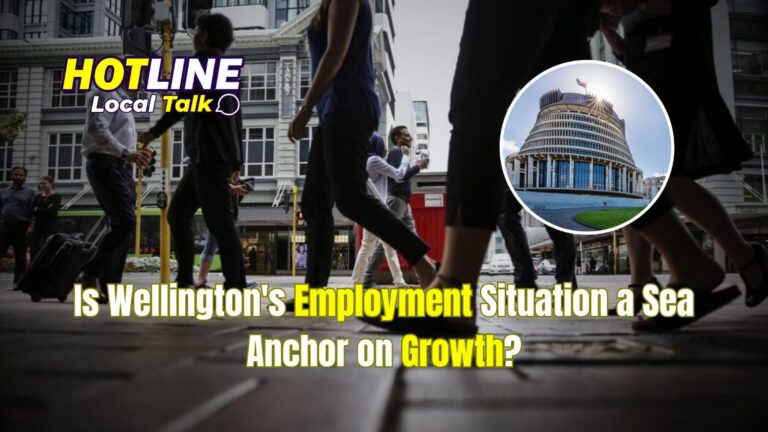Wellington, the capital city of New Zealand, has a job market predominantly powered by government employment. This dependency brings both stability and challenges. On one side, Wellington’s reliance on the government sector provides economic security; however, it might also limit the city’s potential for private-sector expansion, potentially acting as a “sea anchor” on broader economic growth. This article explores these contrasting perspectives and possible solutions to diversify Wellington’s economic landscape.
Government Employment Dominance in Wellington
Government jobs are a significant part of Wellington’s workforce, with around 18% of New Zealand’s public sector roles concentrated in the region. In 2023, Wellington’s government sector contributed significantly to employment, where jobs in central and local government dominated workforce growth. According to recent data, approximately 407,200 people worked in New Zealand’s central government, reflecting the importance of public sector jobs in sustaining Wellington’s economy.
The Stability Argument: Government Jobs as Economic Anchors
Advocates of government-focused employment argue that such positions provide reliable job opportunities, which are especially valuable during economic downturns. Public sector roles offer stability in salary and benefits, which can help Wellington’s workforce weather financial uncertainties and support the local economy. The strong presence of government roles means that the city often enjoys lower unemployment rates, which were around 4% in early 2023—relatively stable compared to the private sector.
Picture source: amp.rnz.co.nz
Additionally, the government’s influence often supports sectors such as education and social services, creating a steady demand for skilled workers in these areas. This reliability, proponents suggest, sustains Wellington’s economic resilience and keeps employment rates steady.
Lack of Industry Diversity: A Barrier to Economic Growth?
While government employment provides stability, critics argue that Wellington’s limited industry diversity constrains its growth. Compared to cities like Auckland and Christchurch, Wellington has less private-sector representation in high-growth areas like technology and manufacturing. Private industries often drive innovation, attract foreign investment, and create entrepreneurial opportunities. In Wellington, this lack of diversity could stifle creativity and limit job creation in emerging sectors.
Picture source: mbie.govt.nz
The city’s overall job growth rate lags slightly behind other regions; for instance, in 2023, Wellington’s employment increased by 1.5%, compared to higher rates in Otago and Bay of Plenty. This slower growth may reflect Wellington’s limited appeal to private companies, potentially impacting future development and the city’s ability to attract a varied workforce.
Possible Solutions: Enhancing Economic Diversity
To address the reliance on government jobs, Wellington can explore strategies to foster private-sector growth. Firstly, city planners and business leaders could focus on policies that incentivise tech and start-up ventures. Establishing hubs for innovation and easing tax burdens for new businesses could attract more private companies to Wellington.
Picture source: amp.rnz.co.nz
Another approach involves improving infrastructure to make the city more appealing to diverse industries. Enhancing digital connectivity, transportation, and housing affordability would make Wellington an attractive base for companies and employees. In addition, promoting collaboration between the public and private sectors may create avenues for development in underrepresented fields, potentially reducing the economic risks of government dependency.
Conclusion
Wellington’s employment situation presents a dual reality. Government employment offers stability, ensuring that economic fluctuations have less impact on the city’s job market. However, this reliance may also restrict Wellington’s economic diversity, potentially hindering broader growth. By adopting policies that support private-sector expansion and attract diverse industries, Wellington can build on its strengths while setting a course for sustainable economic development.
Balancing stability and diversity will be crucial for Wellington as it navigates future growth.
TRUTH SEEKER
Instantly run a Quiz with friends... about the article. Interact more & analise the story. Dig in, catch out biased opinions, and "fact check" with TRUTH SEEKER by ONENETWORK WELLINGTONLIVE 👋
Do you agree with the main argument of this article?
Total votes: 0
What percentage of New Zealand's public sector roles are concentrated in Wellington?
Bias Analysis
Fact Check Summary
True. Jobs in central and local government dominated workforce growth in Wellington in 2023.
Source: Article
False. Wellington's employment increased by 1.5% in 2023, lagging behind Otago and Bay of Plenty.
Source: Article








